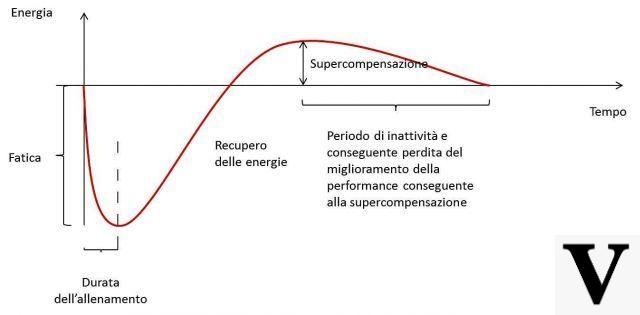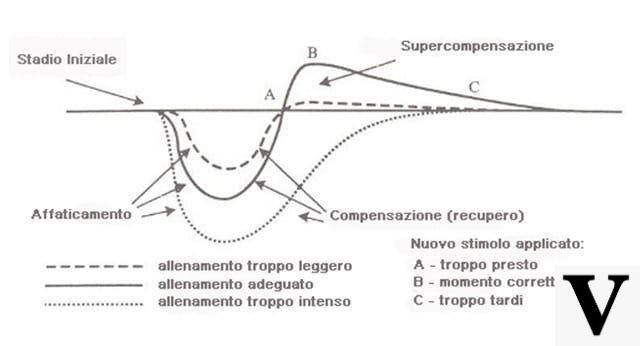Supercompensation: What is it?
What is supercompensation?
Supercompensation is a theoretical model that explains the body's adaptation process to a specific training stimulus. This concept is based on the state of dynamic equilibrium, called homeostasis, which regulates all the activities of our body.
We can therefore define supercompensation as the physiological response to the disruption of homeostasis by the training stimulus.
In order not to succumb to the recurrence of a workload of the same intensity, the body thus triggers a process of supercompensation, which aims to improve the original performance level. The metabolic reserves, the metabolism and the various anatomical structures stressed therefore do not return to the initial state but, for a certain time, exceed it, placing themselves at a slightly higher value.

The performance improvement process goes through a fundamental process which, from training (administration of an organic stress element), leads to performance improvement (organic adaptation to induced stress).
This process takes place as follows:
Stress administration à alteration of balance à adaptation and compensation à achievement of a higher functional level: supercompensation.
What is Needed to Induce Supercompensation?

1. A training stimulus of the right intensity: if the load used does not create a stress, there will not be the conditions to induce our body to a reaction (see dashed line in the graph). Conversely, if training is excessively stressful, our body will not be able to trigger the improvement process (see dotted line).
2. An eligible payback period: if we impose a new stress too soon, we don't give our body time to overcompensate and thus improve (see point A). Even if we spend too many days between one stimulus and the next, we will not get good results, since our body will have returned to the starting state (see point C).
The goal is to train again at the height of the supercompensation phase (point B).
If we are training with the right intensity and frequency, our performance will increase from training to training (at least theoretically).
On the contrary, if we do not recover and much less overcompensate, we could face this other scenario where our performance deteriorates from training to training.
When should you train again?
Zatsiorsky states that the ratio of fatigue to supercompensation is 1: 3. For example, if the training has such an intensity that we tire for 24 hours (negative parable), then the supercompensation will happen about 3 days after the initial stimulus, if we train more intensely with a fatigue that can last 2/3 days, we may need 6-9 days to reach the supercompensation.
Obviously this is not a hard and fast rule: we must also consider the subjectivity of each of us, there are those who recover more easily and those lessFurthermore, age, training seniority, lifestyle, the right diet, rest, understood not only as quantity, but also as quality and integration, are parameters that inevitably influence recovery and supercompensation times .
Limits of the theory and conclusions
The supercompensation model is simple and provides a basis for explaining what happens when we train.
Training breaks the homeostasis of our body which reacts by implementing compensation systems for the energy imbalance (glycogen and phosphate stocks) induced by training stress.
This compensation system is not limited to the recovery of the energy expended, therefore to a restoration of the starting condition, but realizes an increase of the latter aimed at better preventing any new stimuli. It follows that, in the face of the training stimulus, a body adaptation derives that puts the organism in a better situation from an athletic point of view.

Offsetting and overweighting takes a certain amount of time. Shorter or longer depending on
the volume and intensity of the stimulus provided and the athlete's starting situation. More trained subjects tend to compensate (recover) earlier, particularly heavy training inputs require longer recovery periods.
Nutrition, rest and supplementation strongly affect the time it takes for our body to overcompensate.
However, the supercompensation model has limitations:
1. Our body is governed by thousands of chemical reactions that involve thousands of substances in retroactive and interrelated processes. Thinking of being able to explain the behavior of the most complex machine in the world with a single law is very reductive ... It is fascinating to find the answer to your whys in this simple form, but it can be misleading.
2. There are many energetic processes within our body, and a "stress" subjects them all to a stimulus. All overcompensate, but not at the same time. Imagine that at any given moment there are thousands of these graphs unfolding. Processes that overcompensate in a few hours, others in several hours, others in days.
3. Assuming that it is possible to determine a relationship for every process that occurs in our body, then if we cannot take measurements, we actually do not know where we are on the curve.


























